 Another step forward has just been taken in the area of synthetic biology. Researchers have transformed bacteria into 'secret agents' that can give warning of a disease based solely on the presence of characteristic molecules in the urine or blood. To perform this feat, the researchers inserted the equivalent of a computer programme into the DNA of the bacterial cells.
Another step forward has just been taken in the area of synthetic biology. Researchers have transformed bacteria into 'secret agents' that can give warning of a disease based solely on the presence of characteristic molecules in the urine or blood. To perform this feat, the researchers inserted the equivalent of a computer programme into the DNA of the bacterial cells.
Jun 2nd, 2015
Read more
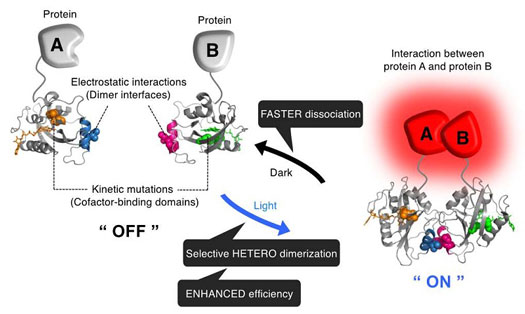 Researchers have developed small photoswitching proteins that enable the highly accurate control of the activity of various intracellular molecules at will by irradiation with light.
Researchers have developed small photoswitching proteins that enable the highly accurate control of the activity of various intracellular molecules at will by irradiation with light.
Jun 2nd, 2015
Read more
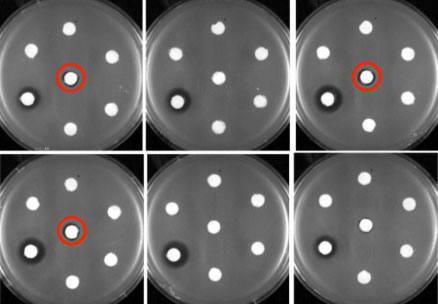 Like a dairy farmer tending to a herd of cows to produce milk, researchers are tending to colonies of the bacteria Escherichia coli to produce new forms of antibiotics - including three that show promise in fighting drug-resistant bacteria.
Like a dairy farmer tending to a herd of cows to produce milk, researchers are tending to colonies of the bacteria Escherichia coli to produce new forms of antibiotics - including three that show promise in fighting drug-resistant bacteria.
May 29th, 2015
Read more
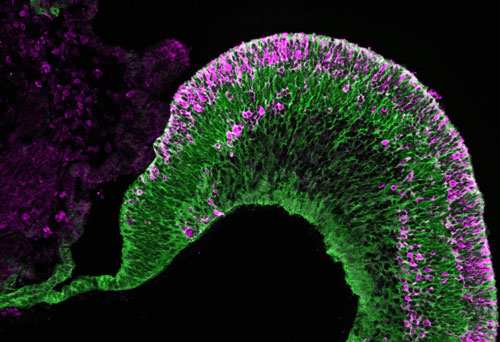 Embryonic stem cells give rise to three-dimensional, multilayered retinal tissue in a dish.
Embryonic stem cells give rise to three-dimensional, multilayered retinal tissue in a dish.
May 29th, 2015
Read more
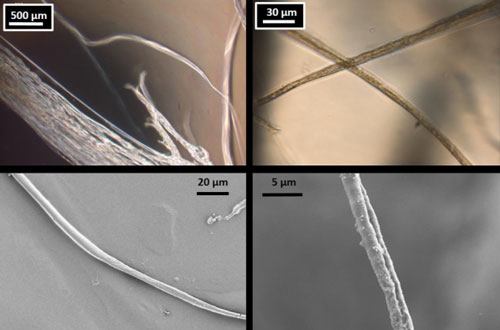 Simulations and experiments aim to improve on spiders in creating strong, resilient fibers.
Simulations and experiments aim to improve on spiders in creating strong, resilient fibers.
May 28th, 2015
Read more
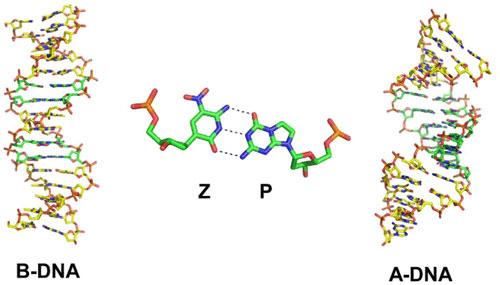 The DNA encoding all life on Earth is made of four building blocks called nucleotides, commonly known as 'letters', that line up in pairs and twist into a double helix. Now, two groups of scientists are reporting for the first time that two new nucleotides can do the same thing - raising the possibility that entirely new proteins could be created for medical uses.
The DNA encoding all life on Earth is made of four building blocks called nucleotides, commonly known as 'letters', that line up in pairs and twist into a double helix. Now, two groups of scientists are reporting for the first time that two new nucleotides can do the same thing - raising the possibility that entirely new proteins could be created for medical uses.
May 27th, 2015
Read more
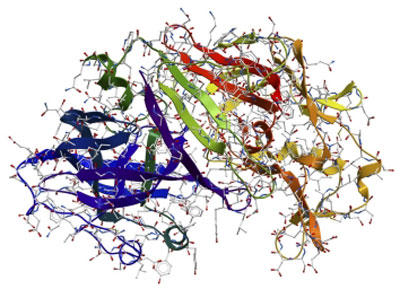 MicroRNA can serve as a 'decoder ring' for understanding complex biological processes, a team of New York University chemists has found. Their study points to a new method for decrypting the biological functions of enzymes and identifying those that drive diseases.
MicroRNA can serve as a 'decoder ring' for understanding complex biological processes, a team of New York University chemists has found. Their study points to a new method for decrypting the biological functions of enzymes and identifying those that drive diseases.
May 26th, 2015
Read more
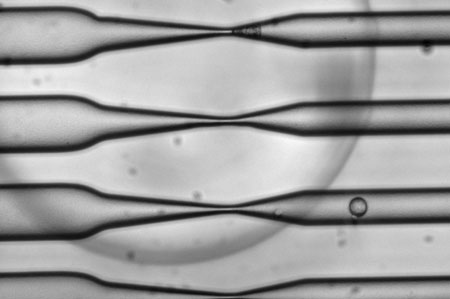 Microfluidic cell-squeezing device opens new possibilities for cell-based vaccines.
Microfluidic cell-squeezing device opens new possibilities for cell-based vaccines.
May 26th, 2015
Read more
Lung cancer researchers have discovered a novel strategy to exploit apoptosis, a form of programmed cell death, for the treatment of lung cancer. The protein Bcl-2 is a known target for cancer treatment since it allows cancer cells to evade cell death via apoptosis.
May 22nd, 2015
Read more
Cell therapies require a purification step that isolates the desired cell types from contaminating cells. Normally cell surface receptors are used as markers to distinguish cell types, but undesired cell types also show these receptors, compromising purification. Evidence suggests microRNA may be a better marker. New biotechnology, miRNA switches, purifies different cell types based on miRNA markers at levels suggesting applicability to patient care.
May 22nd, 2015
Read more
Two separate research teams have developed high-throughput techniques to quickly, easily and inexpensively give every individual cell in a sample a unique genetic barcode.
May 22nd, 2015
Read more
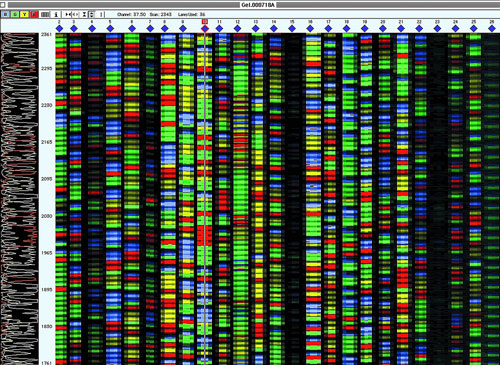 The world's first reference material to help ensure laboratories accurately 'map' DNA for genetic testing, medical diagnoses and future customized drug therapies is now available from the National Institute of Standards and Technology (NIST).
The world's first reference material to help ensure laboratories accurately 'map' DNA for genetic testing, medical diagnoses and future customized drug therapies is now available from the National Institute of Standards and Technology (NIST).
May 22nd, 2015
Read more
A dramatic video has captured the behaviour of cytotoxic T cells - the body's 'serial killers' - as they hunt down and eliminate cancer cells before moving on to their next target.
May 19th, 2015
Read more
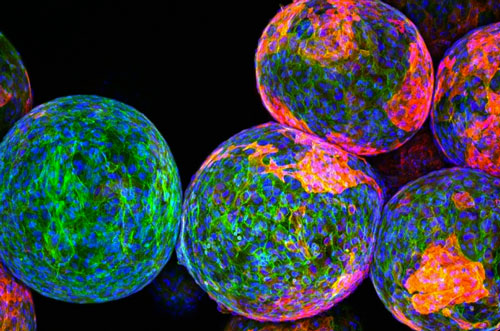 Optimal size and shape allow implantable devices to last longer in the body.
Optimal size and shape allow implantable devices to last longer in the body.
May 19th, 2015
Read more
Researchers are pursuing a new concept in treatment of epithelial cancer, especially head and neck cancer, by using two promising 'analogs' of an old compound that was once studied as a potent anti-tumor agent, but long ago abandoned because it was too toxic.
May 18th, 2015
Read more
Researchers successfully measured metabolic profiles, or the metabolomes, of different brain regions, and their findings could help better understand neurodegenerative diseases. The metabolome represents all or at least a large part of the metabolites in a given tissue, and thus, it gives a snapshot of its physiology.
May 18th, 2015
Read more
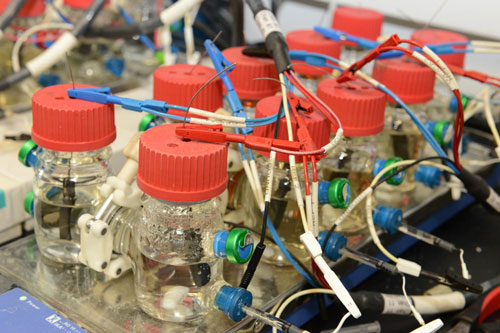 Scientists have solved a long-standing mystery about methanogens, unique microorganisms that transform electricity and carbon dioxide into methane. They demonstrate for the first time how methanogens obtain electrons from solid surfaces. The discovery could help scientists design electrodes for microbial 'factories' that produce methane gas and other compounds sustainably.
Scientists have solved a long-standing mystery about methanogens, unique microorganisms that transform electricity and carbon dioxide into methane. They demonstrate for the first time how methanogens obtain electrons from solid surfaces. The discovery could help scientists design electrodes for microbial 'factories' that produce methane gas and other compounds sustainably.
May 18th, 2015
Read more
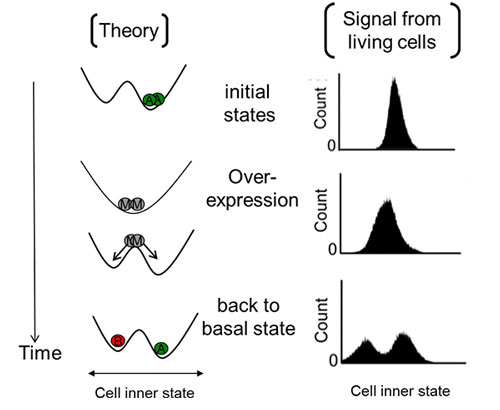 Scientists have devised a theoretical expression of cell reprograming and proved the idea by using synthetic-biology experiments where simplified genetic circuits were constructed in living cells.
Scientists have devised a theoretical expression of cell reprograming and proved the idea by using synthetic-biology experiments where simplified genetic circuits were constructed in living cells.
May 15th, 2015
Read more
 Another step forward has just been taken in the area of synthetic biology. Researchers have transformed bacteria into 'secret agents' that can give warning of a disease based solely on the presence of characteristic molecules in the urine or blood. To perform this feat, the researchers inserted the equivalent of a computer programme into the DNA of the bacterial cells.
Another step forward has just been taken in the area of synthetic biology. Researchers have transformed bacteria into 'secret agents' that can give warning of a disease based solely on the presence of characteristic molecules in the urine or blood. To perform this feat, the researchers inserted the equivalent of a computer programme into the DNA of the bacterial cells.
 Subscribe to our Biotechnology News feed
Subscribe to our Biotechnology News feed









